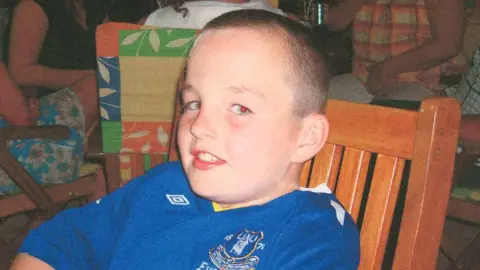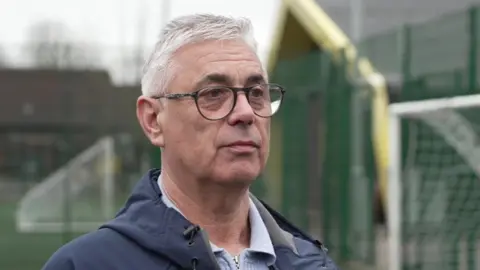Liverpool gun murders: 'Sadly, it's probably going to happen again'
 Handout
HandoutWhen 11-year-old Rhys Jones was shot dead in the crossfire between two warring gangs in Liverpool, the community was shocked to the core.
The Everton-mad schoolboy was hit by a stray bullet as he made his way home from football practice in the Croxteth area of the city on 22 August 2007.
It led to much soul-searching and a real desire to ensure no other family had to endure the unbearable pain suffered by Rhys's family and friends.
And yet, 15 years to the day later, another child - nine-year-old Olivia Pratt-Korbel - was also shot dead by a member of the city's criminal fraternity - "high level" drug dealer Thomas Cashman.
Football coach Stephen Geoghegan was just yards away when Rhys was shot.
He told BBC North West Tonight: "I wasn't surprised that it's happened again. Obviously I was shocked and saddened.
"But there's that many guns on the streets - it's a free-for all. These people have no respect for anyone or anything.
"And sadly it's probably going to happen again."
Mr Geoghegan said Olivia's murder had triggered intensely painful memories of the day Rhys died in his mother's arms.
"I was there when it happened," he said. "So it will never leave me, ever... and to think that poor Olivia's family have got to go through what Rhys' family went through."
Like other parents in Croxteth, the football coach said that he became very worried about his own son's safety after Rhys's death.
"I was frightened to let him out on his own - I used to start panicking if he was out for more than half an hour," he said.

Gun crime in Merseyside
There is a decidedly mixed picture when you examine the statistics.
The number of firearms offences in Merseyside fell from 29 per 100,000 people in 2007/08 to 15 in 2021/22.
During the same period, London's rate dropped much more steeply, from 44 per 100,000 down to 12.
This meant Merseyside had a higher rate of firearms offences than the capital.
Furthermore, the number of fatalities has not decreased - Rhys Jones was one of four gun crime victims in Merseyside in 2007.
Last year there were five - Sam Rimmer, Ashley Dale, Jacqueline Rutter, Elle Edwards, and Olivia Pratt-Korbel.
In the intervening years an average of three people have been killed by guns in Merseyside, with 2014 being the only year without a single fatality.
Sources: Merseyside Police & Office for National Statistics

For many years Mr Geoghegan also worked with young offenders who were in secure accommodation.
Drawing upon that insight, he warned of a "lost generation" of children who are deeply involved in criminal activity.
He said: "The lure of money through drugs, the lifestyle these kids see, the lifestyle these high-profile criminals have.
"I am sure he's going to choose a new BMW to drive round the streets before he takes up my job in a warehouse."
 Family handout
Family handoutMerseyside Police said it was working "relentlessly" to reduce gun crime.
Assistant Chief Constable Chris Green said: "We've got individuals who've got no regard for the rest of society, no regard for the consequences of their actions.
"They have got no moral compass."
He said his officers would be "relentless, as we have been over the past 20 years, to make sure that we identify all those who are responsible, bring them to justice, and place them behind bars."
Senior investigating officer Det Supt Mark Baker said along with Rhys's murder 15 years previously, the fatal shooting of Olivia would undoubtedly be seen as a "watershed moment".
He said Olivia had been "cowering behind her mum. She was extremely frightened because she's heard gunshots and she was hiding behind her mum in her own house.
"And the gunman has gone into the house. He will have seen and - when he fired that fourth shot into the house with the bullet going through the door, through Cheryl Korbel's hand and into Olivia - he will have heard the screams and he's continued to carry on shooting inside the house.
"We were extremely shocked at that level of relentless, careless pursuit and total disregard for any other life."
'Absolutely deadly'
His colleague Det Ch Supt Mark Kameen said extremely powerful weapons were still reaching Merseyside's criminals.
"Handguns are the weapon of choice," he said, "but we are now seeing Skorpions coming into the force area.
"These sub-machine guns have a huge rate of fire, they're absolutely deadly."
The force has been piloting a new strategy - Clear, Hold, Build - which it believes is already yielding positive results.
- Clear - Acting on intelligence from the public and their own covert operations, officers remove criminals from a location through arrests and prosecutions
- Hold - Police prevent new gangs filling the vacuum
- Build - The local council, businesses and voluntary organisations pull together to create a safer and more prosperous community
Mr Green said: "We have seen that work really, really successfully in places like Speke, Croxteth, Norris Green, and parts of Liverpool 8."
Merseyside Police also supports 60 projects - covering education, training and employment - which try to steer young people away from crime by offering better alternatives.

But Mr Geoghegan said there was not enough being done at an earlier age, starting at 10 or 11 years old, to both teach children about the negative effects of crime and violence, and the positive benefits of work and family.
Current schemes designed to help young people in danger of being sucked into a life of crime are just not working, he said.
"There's a lot of programmes, but it's got to be the right people delivering the programmes and the right content," he said, warning of the consequences of inaction.
"Until that happens this is going to continue unfortunately.
"I don't think there's anyone who can put their hand on their heart and say this isn't going to happen again - you just know it is."

Panorama reporter Bronagh Munro investigates how Liverpool came to dominate the UK drug market.

Why not follow BBC North West on Facebook, Twitter and Instagram? You can also send story ideas to [email protected]
